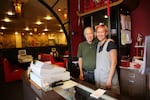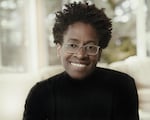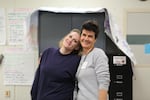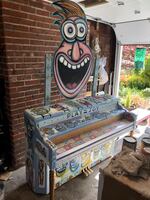"Think Out Loud" brings listeners around 760 interviews or recorded audio segments every year. The producers who work on those segments naturally have some favorites that they remember more than others. Each year around this time, the producers have a chance to share some of their favorites with you.

Cindy Louis became the third generation in her family to own and operate the Canton Grill, after she took the restaurant over from her father, Fred Louis. The restaurant is celebrating its 75th anniversary in August.
Samantha Matsumoto / OPB
Samantha Matsumoto
The first time I went into the Canton Grill, I thought, "We have to do a show here." Producer Julie Sabatier and I came across the restaurant when we were working on another project about Southeast 82nd Avenue, and we were immediately captivated by its story: Owned by the same Chinese American family for three generations, this restaurant is a still-living part of Portland history.
We went back to the Canton Grill for its 75th anniversary in August to talk with its owners, Cindy Louis and her father, Fred. Listening to the changes they’ve seen during their years at the restaurant is astounding. Southeast 82nd Avenue and the surrounding area is now a vibrant Asian American community, but when Fred’s father opened the restaurant in 1944, it was on the very edge of town. In part because of the Canton Grill’s success, other Asian restaurants and shops opened around it in the coming years. The Louis family and their restaurant actually helped shape the Portland that we know today.

Jacqueline Woodson is the author of many books for children and young adults in addition to her bestselling memoir "Brown Girl Dreaming."
Carlos Diaz
Julie Sabatier
One of the great things about my job is that I get to read books for work and, often, they're books I might not have discovered were it not for "Think Out Loud." And that was the case for Jacqueline Woodson. Even though she's a prolific writer who has won numerous awards, I hadn't read any of her work before. I got to read one of her young adult books, her memoir, and a few of her children's books in preparation for the hour we spent with her at Literary Arts earlier this year.
Her writing is lyrical, inviting and poignant. She is someone who is able to reach back across her memory to access her childhood self and it shows in her writing, both the material that’s meant for kids and the material that’s meant for older readers. We had a small audience with us in person at Literary Arts and a bunch of them were students who had read Jacqueline Woodson’s work. They had some great questions for her.
When one of them asked her about her memoir, "Brown Girl Dreaming," which is written in verse, Woodson talked about how she wanted to write in the voice of herself as a young person. The student who asked the question said the language in the book “sounds like you’re talking to someone.”

Jessica (left) and Anna Debenham inside one of the classrooms at Coffee Creek Correctional Institution, the state's only women's prison, where The Insight Alliance classes take place.
Allison Frost / OPB
Tess Novotny
Certain moments of clarity come when we’re drowning and reaching out to catch our breath. Others arrive silently from all different directions at once. A dozen weather-worn cargo ships uniting at the same dock.
I had never been to a prison before Coffee Creek. On the drive over, I read personal descriptions of each of the dozen inmates we were meeting. The interview, produced by Allison Frost, centered around a mental health class they all took in prison.
In the windowless classroom where we met, a trans man described navigating life in a women’s prison. A wife said she used to cry herself to sleep because she didn’t know if her victim could forgive her. A childhood trauma survivor explained her dissociative disorder, which puts her “up into a bubble” when things get bad. The microphone got hot when the conversation turned to what they learned in class: “You did the best you could with what you knew at the time;” “Thoughts are like weather clouds;” “Feelings are not germs.” When host Dave Miller asked who might not be incarcerated if they took the class earlier, a dozen hands shot up.
On the drive back, I realized the inmates redefined how I understood freedom. In many ways, freedom is a state of mind — not a place, decision or lifestyle. Freedom is self-reflection, accountability and letting go.
A dozen quiet ships.

A piano decorated by artist Gary Hirsch for Piano. Push. Play.
Courtesy of Gary Hirsch
Dave Miller
Seven years ago, Megan McGeorge started "Piano Push Play" with a really simple idea: she put a bunch of pianos in public areas for anyone to play. I was really taken by her description of what happened after that: people rediscovered their love making music. Folks who had burned out in music school, or gotten used to playing piano in a competitive way, were able to remember why they started playing music in the first place.
And this wasn’t just about music: it was a passionate call for all of us to do things that give us joy. Even if you can’t jump as high as you used to, or run as fast as you’d like, or paint like an old master, or flip a perfect omelet, there’s joy to be found in striving, in tinkering, in trying. It was a reminder to reclaim the word “amateur” from its status as an epithet and return its original meaning: people who do things not for obligation or money but love.

Cindy Werhane swam for 20 straight hours in her attempt to circle Sauvie Island.
Courtesy of Christopher Graefe
Sage Van Wing
In July we spoke to Cindy Werhane, an oncology nurse who had recently swum nearly all the way around Sauvie Island. Werhane made it 30 of the 38 miles around the island, many of them swimming upstream against the current and without a wetsuit.
As a swimmer myself, I know that when you’re alone with your thoughts for a long time in the water, even little things start to feel very big. Werhane put a lot of time into preparation and training for this attempt. She made sure to vary her food, so that when she tread water to eat every 30 minutes she wouldn’t be eating the same thing. She shaved the back of her neck to try to prevent chafing from her swim cap. She practiced swimming for hours, then going into long shifts on the oncology ward, and then getting immediately into the water again to learn what it felt like to keep pushing even when you haven’t slept.
I cannot begin to imagine the physical and emotional stamina it would take to keep going over 20 hours when the voices in your head keep telling you to stop. The bravery, as she said, was in the attempt.
Other shows we discuss in this hour:
Having Difficult Conversations With Kids